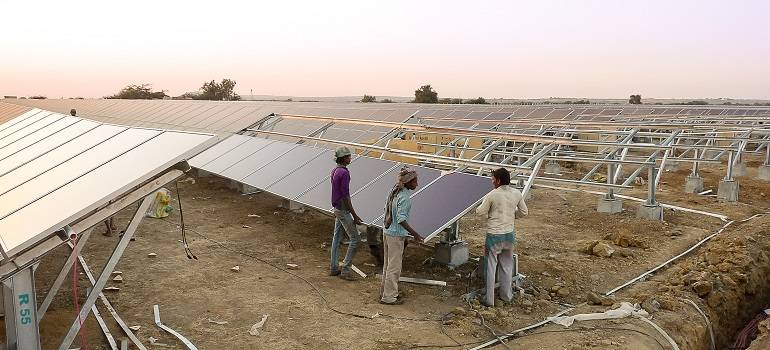 Dumping of Chinese solar panel in India, once a major exporter of the product, is estimated to have cost 200,000 jobs, a parliamentary panel said on Thursday and asked the commerce department to properly implement its probing arm DGAD’s suggestions on cheap imports from China.
Dumping of Chinese solar panel in India, once a major exporter of the product, is estimated to have cost 200,000 jobs, a parliamentary panel said on Thursday and asked the commerce department to properly implement its probing arm DGAD’s suggestions on cheap imports from China.
Expressing shock at the job loss estimates it quoted, the panel strongly recommended resolution of problem of poor implementation of the findings of the Directorate General of Antidumping and Allied Duties on dumping of Chinese goods as also subsidies they get.
These observations have been made by Parliament Standing Committee on Commerce in its report on impact of Chinese goods on Indian industry.
It is disheartening to note that India was one of the major exporters of solar products including solar panel between 2006-2011 before China started dumping their products at the cost of Indian manufacturers.
“Presently, the exports from India have been decimated and brought to a standstill,” the report said, adding that the government must take strong note of such dumping.
Immediate trade remedial measures need to be deployed to protect the domestic solar industry, it said.
“The anti-dumping framework also suffers with lax implementation. The unscrupulous elements are able to import the Chinese goods by circumventing the goods put under anti-dumping framework through misclassification of products,” it added.
On steel sector, the report stated that nothing has been done to revise or rationalize the anti-dumping duty imposed.
It recommended that the steel industry, in consultation with DGAD, look into this matter on an urgent basis and make the anti-dumping duties realistic and effective to ward-off any adverse consequences of dumping of Chinese steel goods in the country.
The report also said there are concerns about the mega trade deal — Regional Comprehensive Economic Partnership (RCEP), of which India and China are participants along with 14 other countries.
It suggested following caution during the negotiations and asked the government to calibrate its approach in such kind of agreement.
The RCEP bloc comprises 10 Asean group members (Brunei, Cambodia, Indonesia, Malaysia, Myanmar, Singapore, Thailand, the Philippines, Laos and Vietnam) and their six FTA partners — India, China, Japan, South Korea, Australia and New Zealand.
India’s trade deficit with China increased to $63.12 billion in 2017-18, from $51.11 billion in 2016-17.
“…nothing should be agreed to at the cost of our industrial health,” the panel said.
Further noting that tariff barrier is an important tool to counter dumping of Chinese goods, it said: “The government tariff protection must also be accompanied with production subsidy or incentives which can be a match to Chinese assistance so that our domestic production gets a real boost.”
On pharmaceutical industry, the report said that it is high time that India’s dependency on Chinese bulk drugs has reduced drastically.
“Such a strategic product cannot be left at the mercy of China as it impacts the nation’s health security,” it said.
To protect textiles sector, the report suggested hike in customs duty on garment imports.
It also said that all zero duty access that have been provided on imports of garments into India should be made subject to sourcing of raw materials from India.
Commenting on the firecracker industry, it called for prohibiting import of hazardous Chinese firecrackers.
Source: PTI
ALSO READ:
Survey would be soon conducted for solar power generation in flood-prone areas in Bihar
Chandigarh administration extends solar rooftop plant installation deadline to November 17
Commerce ministry recommends imposition of 25 percent safeguard duty on solar cells


